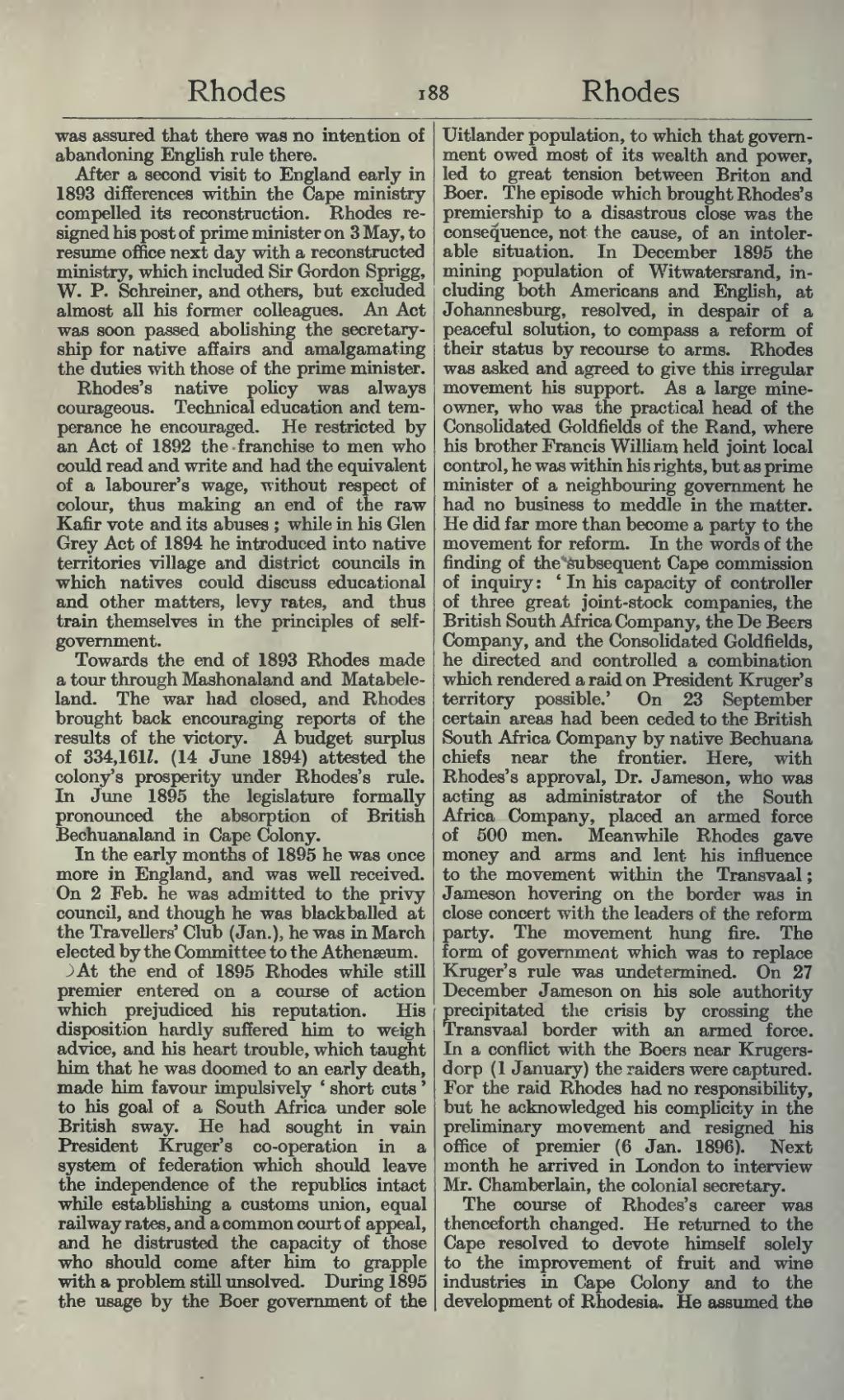was assured that there was no intention of abandoning English rule there.
After a second visit to England early in 1893 differences within the Cape ministry compelled its reconstruction. Rhodes resigned his post of prime minister on 3 May, to resume office next day with a reconstructed ministry, which included Sir Gordon Sprigg, W. P. Schreiner, and others, but excluded almost all his former colleagues. An Act was soon passed abolishing the secretaryship for native affairs and amalgamating the duties with those of the prime minister.
Rhodes's native policy was always courageous. Technical education and temperance he encouraged. He restricted by an Act of 1892 the franchise to men who could read and write and had the equivalent of a labourer's wage, without respect of colour, thus making an end of the raw Kafir vote and its abuses ; while in his Glen Grey Act of 1894 he introduced into native territories village and district councils in which natives could discuss educational and other matters, levy rates, and thus train themselves in the principles of self-government.
Towards the end of 1893 Rhodes made a tour through Mashonaland and Matabeleland. The war had closed, and Rhodes brought back encouraging reports of the results of the victory. A budget surplus of 334,161l. (14 June 1894) attested the colony's prosperity under Rhodes's rule. In June 1895 the legislature formally pronounced the absorption of British Bechuanaland in Cape Colony.
In the early months of 1895 he was once more in England, and was well received. On 2 Feb. he was admitted to the privy council, and though he was blackballed at the Travellers' Club (Jan.), he was in March elected by the Committee to the Athenæum. At the end of 1895 Rhodes while still premier entered on a course of action which prejudiced his reputation. His disposition hardly suffered him to weigh advice, and his heart trouble, which taught him that he was doomed to an early death, made him favour impulsively 'short cuts' to his goal of a South Africa under sole British sway. He had sought in vain President Kruger's co-operation in a system of federation which should leave the independence of the republics intact while establishing a customs union, equal railway rates, and a common court of appeal, and he distrusted the capacity of those who should come after him to grapple with a problem still unsolved. During 1895 the usage by the Boer government of the Uitlander population, to which that government owed most of its wealth and power, led to great tension between Briton and Boer. The episode which brought Rhodes's premiership to a disastrous close was the consequence, not the cause, of an intolerable situation. In December 1895 the mining population of Witwatersrand, including both Americans and English, at Johannesburg, resolved, in despair of a peaceful solution, to compass a reform of their status by recourse to arms. Rhodes was asked and agreed to give this irregular movement his support. As a large mine-owner, who was the practical head of the Consolidated Goldfields of the Rand, where his brother Francis William held joint local control, he was within his rights, but as prime minister of a neighbouring government he had no business to meddle in the matter. He did far more than become a party to the movement for reform. In the words of the finding of the' Subsequent Cape commission of inquiry : 'In his capacity of controller of three great joint-stock companies, the British South Africa Company, the De Beers Company, and the ConsoUdated Goldfields, he directed and controlled a combination which rendered a raid on President Kruger's territory possible.' On 23 September certain areas had been ceded to the British South Africa Company by native Bechuana chiefs near the frontier. Here, with Rhodes's approval. Dr. Jameson, who was acting as administrator of the South Africa Company, placed an armed force of 500 men. Meanwhile Rhodes gave money and arms and lent his influence to the movement within the Transvaal ; Jameson hovering on the border was in close concert with the leaders of the reform party. The movement hung fire. The form of government which was to replace Cruger's rule was undetermined. On 27 December Jameson on his sole authority precipitated the crisis by crossing the Transvaal border with an armed force. In a conflict with the Boers near Krugersdorp (1 January) the raiders were captured. For the raid Rhodes had no responsibility, but he acknowledged his complicity in the preliminary movement and resigned his office of premier (6 Jan. 1896). Next month he arrived in London to interview Mr. Chamberlain, the colonial secretary.
The course of Rhodes's career was thenceforth changed. He returned to the Cape resolved to devote himself solely to the improvement of fruit and wine industries in Cape Colony and to the development of Rhodesia. He assumed the
